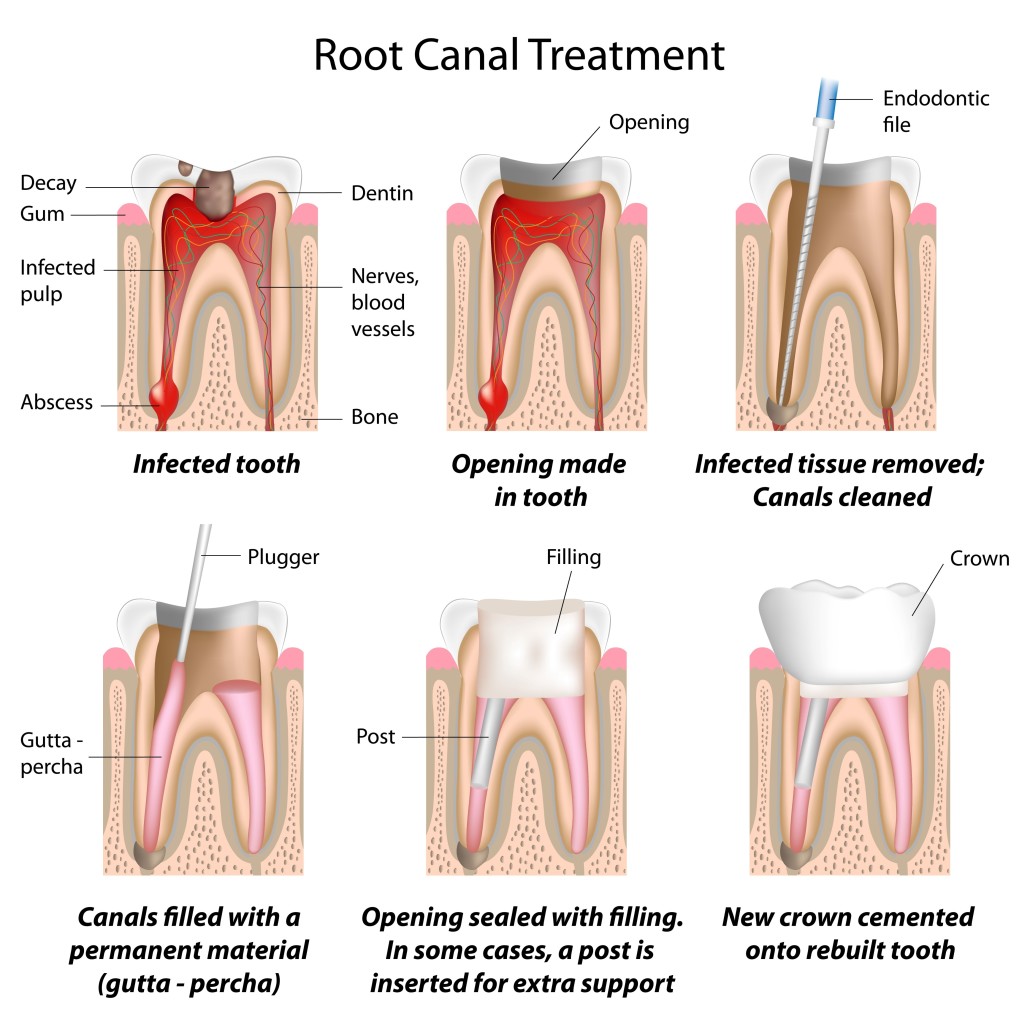
What is a Root Canal?
Probably the least understood dental procedure (and surely surrounded by the most misconceptions), root canals are the only way to save an infected tooth. Once decay and infection penetrate the tooth’s outer enamel layer and the hard dentin layer beneath, it has entered the pulp of the tooth. The pulp contains blood vessels, nerves, and connective tissue. The pulp extends from the crown of the tooth to the tip of the roots. Where these roots run are called the root canals.
When infection enters the pulp, the infected tissues must be removed and the tooth thoroughly cleaned and then filled. This is a root canal. Since permanent teeth no longer need the nourishment provided by the connective tissues and blood vessels in the tooth root (they are only necessary when the tooth is developing), removing these soft tissues doesn’t endanger the health of the tooth. By halting the spread of the infection, a root canal can allow the patient to keep the tooth, potentially for the remainder of his or her life.
When is a Root Canal Needed?
When infection penetrates the enamel and the dentin, the soft tissues of the pulp are defenseless. The infection will spread throughout the tooth and can eventually lead to abscesses and the possible spreading of infection to other parts of the body. When the pulp, where the tooth nerves are found, becomes infected the tooth may become very sensitive. The patient will have pain, prolonged sensitivity to hot or cold, tenderness to the touch and when chewing, discoloration of the tooth, swelling and tenderness of the surrounding gum tissue, and persistent pimples on the gums. The only way to address the infection and pain is to either extract the tooth or to perform a root canal.
What are the Symptoms of Needing a Root Canal?
Pain will be the primary symptom. When the bacteria make their way inside your tooth, the nerve endings will become affected. This will create pain and sensitivity. You will have pain, prolonged sensitivity to hot or cold, tenderness to the touch and when chewing, discoloration of the tooth, swelling and tenderness of the surrounding gum tissue, and persistent pimples on the gums.
Can Cracked Teeth Be Saved?
A tooth with a deep crack usually can only be saved by placing a crown over the tooth. That’s because the structural integrity of the tooth has been adversely affected by the crack. A cracked tooth will usually need a root canal if it has been cracked for some time, as bacteria will likely have made its way inside the tooth. The crown is then placed over the tooth. This gives the tooth strength for biting and chewing. Without a crown, the cracked tooth would otherwise likely need extraction and replacement with a dental implant or a bridge.
Not all severely cracked teeth can be saved, however.
What To Expect During A Root Canal
Some root canals can be done in one visit, however, in some cases, a root canal requires two appointments with the Broadway Family Dentistry team in Minot, ND.
- During the first appointment, we first numb the tooth and the surrounding area.
- We drill a small hole in the crown of the tooth to gain access to the interior.
- Working through the hole, we use small files to remove all of the infected nerves, blood vessels, and other debris in the pulp cavity and down into the root canals.
- The now-empty tooth cavity is then flushed with water and sodium hypochlorite to remove any remaining debris and to thoroughly disinfect the interior of the tooth.
- Next, we seal the empty tooth with biocompatible sealer and a rubber based material. We then seal the tooth with adhesive cement, and we close the hole with a traditional dental composite filling. In some teeth, this is sufficient and the procedure is finished.
- When your crown is finished, you return and we place it with a hard set resin cement. Your tooth is good to go to keep you chewing.
What Can I Do to Prevent Needing a Root Canal in the Future?
Not all root canals can be avoided. For instance, if you had traditional braces as a teenager, sometimes the movement can create trauma in a tooth or teeth that show up later inside the tooth requiring a root canal. This is somewhat atypical, however.
The main cause of any root canal is poor home hygiene that has allowed plaque to remain on the teeth.
Undeterred, the bacteria in the plaque have had time to work on the tooth enamel, eventually penetrating the enamel. This is the case of a normal dental cavity and placement of a filling. But if you’re lax about keeping your regular cleaning and exam appointments at Broadway Family Dentistry that decay will keep penetrating deeper into the tooth. When it makes its way into the inner dentin, the tooth will now need a root canal.
So, how to avoid this? Practice diligent, attentive home hygiene. This includes brushing twice daily for two minutes and flossing once a day. And we should see you every six months for professional cleanings and exams. That way, should you show early signs of decay in a tooth, we can remove it and place a small filling. There won’t be a need for a root canal.
Patient Testimonials
"Amazed by their compassion, empathy towards patients and all around wonderful customer service. They got me in on a whim for a root canal and called the next day to see how I was doing. They really care and its a good feeling. Thank you Dr. Jensen!!"
"Words cannot explain how wonderful this place is… the staff is very professional and beyond friendly…The doctor is so gentle and explains everything thoroughly… she is AMAZING! Everyone there makes you feel at ease, and are very kind. I HIGHLY recommend Broadway Family Denistry for all your dental needs!!!"
Root Canal FAQs
Do Root Canals Hurt?
Root canal procedures are surrounded by undeserved fear. People think the procedure is painful but often it doesn’t involve any more discomfort than a typical filling. People tie the pain of their infected tooth to the root canal procedure, but the root canal is the solution to remove the pain. You need to remember that a root canal removes all of the nerves from the infected tooth, so it no longer has any sensation. Afterward, there will be some residual soreness as the surrounding tissues calm down from their former infected state, but this lasts only a day or two and is easily managed with over-the-counter pain medication.
Will I Have Pain After My Root Canal?

The nerve endings are all removed from the inside of the tooth is a root canal, so the tooth will no longer have any sensation. But the surrounding tissues could still be somewhat inflamed, depending on how bad your situation was prior to coming in for your root canal. It could take a few days for these tissues to fully calm down after your root canal, although the pain should quickly decrease. Also, your jaw could be a bit sore after being open for the time necessary to perform your root canal, but this is soreness and not acute pain and is easily manageable.
Does a Root Canal Take More Than One Visit?
The root canal process alone will take only a single appointment. Dr. Jensen/Dr. Hirst creates the hole in the crown of the tooth for access; removes all the inner tissue, blood vessels, and nerve endings; completely disinfects the tooth interior; fills the tooth with gutta-percha, and then usually applies a filling over the hole and places a temporary crown atop the tooth. We will have a dental lab create your custom crown off impressions we take. This will take about two weeks. When it is ready, you’ll return for your second appointment, and we’ll place the new crown over your tooth permanently.
Otherwise, you shouldn’t have anything but a little soreness after your root canal with Dr. Jensen or Dr. Hirst.
After Having a Root Canal is My Tooth Dead?
“Dead” is an interesting term when it comes to a tooth. Once we exit our teenage years and our teeth have finished growing, they no longer require a blood supply or other nourishment. They are completely developed and don’t change moving forward. So, when a tooth is infected or damaged to the degree that it requires a root canal, cleaning out the nerve endings, blood vessels, and other tissue doesn’t really change the tooth. The tooth will no longer have any sensation of hot and cold, and it won’t be able to cause any pain. But this doesn’t mean the tooth will start to fall out of your mouth, as you would assume with something that was “dead.” After a tooth has a root canal, it can remain in your jaw and mouth the remainder of your life. You can chew and bite with it, and you won’t have any idea that this tooth is different than the tooth right next to it.
That’s the whole point of a root canal — saving the tooth.
How Long Will it Take to Recover from a Root Canal?
There isn’t really any recovery necessary. As mentioned, the tooth no longer has any nerve feelings in it. You can bite and chew with the tooth immediately with confidence. There may be some soreness for a day or so, but that’s about it.
Will I Need to Replace My Teeth After a Root Canal?
Will I Need a Dental Crown After Having a Root Canal?
Needing a dental crown after having a root canal is dependent upon the location of the tooth. If a premolar or molar has just had a root canal, it is highly recommended that the teeth towards the back of the mouth have dental crowns placed since they are the ones continuously used to chew food. Without placing a dental crown on top of a tooth after a root canal procedure, reinforcement and strengthening of the tooth can be weakened, causing an increased chance of developing an infection.
How Do I Know If I Need a Tooth Extraction or Root Canal?
Getting a root canal means that your tooth is healthy enough to where it can still be saved and restored by stopping the spread of bacteria with root canal therapy. Tooth extractions are typically needed when the bacteria has spread all throughout the tooth and into the gums. Your dentist will tell you when you need a tooth extraction because the bacteria in your tooth has spread so wide that the natural tooth cannot be saved. When this happens, you will likely need a dental implant or another form of tooth replacement.
Whichever treatment you end up needing, you can be sure Dr. Jensen and Dr. Hirst are here to help not only restore your oral health but also help you achieve a healthier, improved smile!

